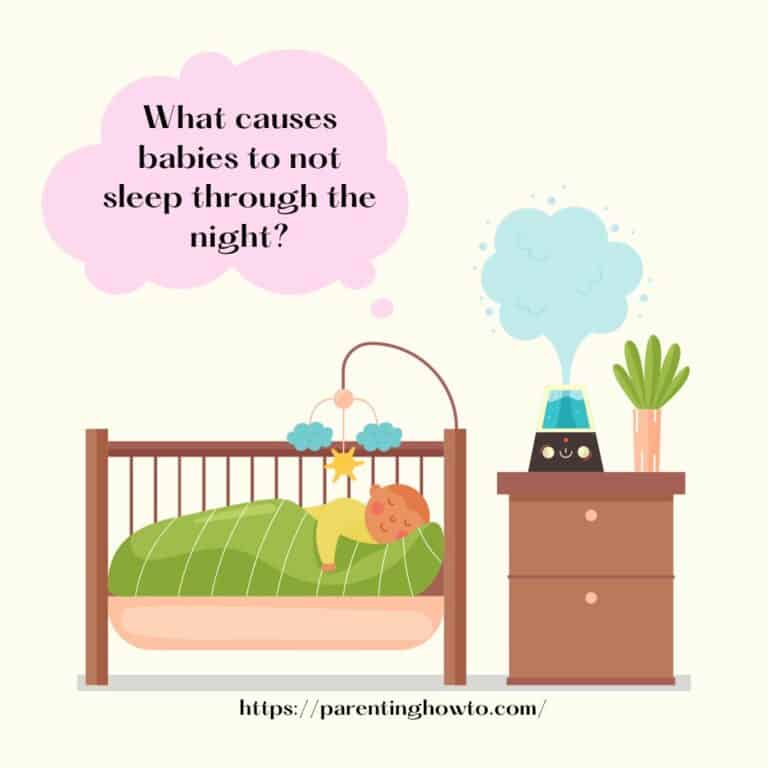Are you worried about why your toddler is gagging for no apparent reason? Gagging can be concerning, but it’s important to remember that it isn’t always cause for alarm. In this blog post, we’ll discuss what might be causing your toddler’s gagging and provide advice on how to best handle the situation.
Recognizing the Signs of Gagging
Gagging is a reflex action that helps protect us from choking. It’s a normal reaction to certain stimuli, such as a foreign object in the mouth or even the smell or taste of certain foods. In some cases, gagging can be related to underlying medical conditions and can interfere with eating, speaking, and swallowing.
Recognizing the signs of gagging can help parents identify when their child needs medical attention. Common signs of gagging include:
• Gagging noises – A loud “ahh-choo!” sound may indicate that your child is trying to expel something from their throat or mouth.
• Coughing or choking – If your child begins coughing or choking after putting food in their mouth, this could be a sign that they are having difficulty swallowing.
• Vomiting – If your child throws up after attempting to swallow something, it could be because they are gagging on it.
• Difficulty breathing – If your child’s breathing becomes labored after attempting to swallow something, it could indicate that there is an obstruction in the airway due to gagging.
• Refusal to eat – Your child may refuse food if they associate it with gagging and feeling sick afterwards.
If you suspect your child may have a more serious condition causing them to gag, such as reflux disease or an allergy-related disorder, seek medical attention immediately for diagnosis and treatment options.
General Causes of Gagging
Gagging is an unpleasant and sometimes frightening experience, especially when it happens to you or your child. It can be caused by a wide variety of factors, including allergies, acid reflux, and infections. Here are some of the most common causes of gagging:
1. Sensitive gag reflex: This is one of the most common causes of gagging and is often seen in children who have not yet developed full control over their ability to swallow food.
2. Acid reflux (GERD): Gastroesophageal reflux disease (GERD) can cause a burning sensation in the throat and chest that can trigger a gagging reaction.
3. Allergies: Allergens such as dust mites or pet dander can irritate the airways and cause gagging as a result.
4. Infections: Infections like sinusitis or tonsillitis can cause inflammation of the throat and lead to gagging as well.
5. Foreign body ingestion: Eating something that should not be swallowed such as a small toy or piece of jewelry can cause choking which may then lead to gagging.
Gagging is usually nothing to worry about but if it persists or becomes severe, it’s important to see your doctor for further evaluation in order to rule out any serious underlying conditions that could be causing the issue.
Health Conditions That May Cause Gagging
Gagging is a reflexive action that occurs when something irritates the upper airway or throat. It is an important reflex that helps keep the airway clear of foreign bodies, such as food and liquid.
Gagging can be caused by a number of health conditions, including swollen tonsils or adenoids, infections, chronic swallowing difficulties, acid reflux (GERD), inflammation of the epiglottis (epiglottitis), oral-motor dysfunction, and food allergies.
Swollen tonsils or adenoids can make it difficult for children to swallow properly and may lead to gagging. If your child has trouble swallowing and a fever, it could be because of an infection.
Chronic swallowing problems may also be caused by GERD or another condition that affects muscle tone in the throat or esophagus. If your child has been having consistent issues with their gag reflex, it might be time to investigate what’s causing it – whether it’s an oversensitive gag reflex, anxiety around eating, GERD, or another health issue.
Food allergies may also cause gagging in toddlers learning to eat solid foods as they try to adjust to different textures and flavors. In some cases, food particles may become stuck in their throats and trigger the gag reflex. If your child throws up and chokes herself every time you try to feed her with certain foods, it could be a sign of food allergies.
If you are worried about your toddler’s gagging episodes for any reason then it is important to speak with your pediatrician as soon as possible for proper diagnosis and treatment recommendations.
Food Sensitivities and Allergies

Food sensitivities and allergies can affect individuals of all ages, but are especially common in babies and children. Food sensitivities are a strong dislike for a particular food, while an allergy is an immune system reaction to something the body views as a threat.
Common signs of food sensitivities/allergies include gagging, vomiting, excessive crying and poor sleep. These symptoms can be seen in babies with infantile colic or gastro-esophageal reflux disease (GERD).
Food allergies can develop at any age, even if you’ve been eating the same food for years without any problems. People who have been exposed to certain foods before may also become sensitized and react when eating them again.
If your baby gags or throws up after consuming certain foods, it could be a sign of a food sensitivity or allergy. If you think your child is experiencing these symptoms, it’s important to talk to their doctor about testing for allergies and creating an appropriate treatment plan.
Overstimulation in Toddlers

Overstimulation in toddlers is a common problem that affects many families. It can be caused by too much noise, bright lights, or even an abundance of toys. It can lead to emotional outbursts, difficulty concentrating, and meltdowns.
Parents need to be mindful of the environment they create for their toddlers and make sure it is not overly stimulating. This means reducing the amount of noise in the home, limiting access to technology like televisions and tablets, and keeping bedrooms free from visual clutter.
It is also important to provide plenty of opportunities for playtime with their parents or siblings. Unstructured playtime allows toddlers to use their imaginations while encouraging positive social interactions with family members.
When overstimulated behaviors occur (such as throwing tantrums), parents should try to remain calm and gently redirect their toddler’s attention elsewhere. In addition, it is important not to reward negative behavior as this will only reinforce it in the future.
Overall, overstimulation in toddlers can be managed with patience and understanding from parents. By creating a calm environment for them and providing plenty of time for playtime with family members, parents can help reduce overstimulation in toddlers significantly!
Swallowing Difficulties or Dysphagia

Swallowing Difficulties or Dysphagia is a condition where an individual has difficulty swallowing food or liquids. This can happen at any age and can be caused by a number of different conditions.
Common causes include neurological problems, muscular disorders, structural abnormalities in the throat, food allergies, and reflux disease. In children, dysphagia can also be caused by prematurity or very low birth weight as well as esophageal cancer.
Symptoms of dysphagia include frequent gagging or choking on food or liquids, coughing or wetting during eating, drooling more than usual when eating, having difficulty starting to swallow after putting food in their mouth, and taking an unusually long time to finish a meal. If your child is experiencing these symptoms they should see their doctor for diagnosis and treatment.
Treatment for dysphagia depends on the underlying cause but may include dietary modifications such as avoiding certain foods that are difficult to swallow; physical therapy to improve muscle coordination; medications; surgery to correct anatomical issues; and speech therapy to help with swallowing techniques and strategies.
It’s important that children with dysphagia receive adequate nutrition so they can reach their full potential in physical and mental development. Parents should talk with their doctor about any concerns they have regarding their child’s difficulties with swallowing food or liquids.
Gastroesophageal Reflux Disease (GERD)

Gastroesophageal Reflux Disease (GERD) is a long-term digestive disorder that occurs when stomach acid flows back up into the esophagus, causing heartburn and other symptoms.
GERD is common in infants, children and adults. Symptoms may include pain or burning in the chest, difficulty swallowing, regurgitation of food or sour liquid, and feeling like something is stuck in the throat.
The cause of GERD is not fully understood but it may be due to problems with the lower esophageal sphincter (LES), a muscle at the bottom of the esophagus that helps keep food and acid down.
The LES can become weak or relax too often, allowing stomach contents to move back up into the esophagus. Other factors such as obesity, smoking, certain medications, certain foods or drinks (such as citrus fruits or caffeinated beverages), hiatal hernia, pregnancy or diabetes can also contribute to GERD.
Treatment for GERD includes lifestyle changes such as avoiding foods that trigger symptoms and eating smaller meals more frequently throughout the day. Medications may also be used to reduce acid production in the stomach. Surgery may be an option for those who do not respond to other treatments.
It’s important to talk with your doctor if you think you or your child may have GERD so they can develop a treatment plan that works best for you.
Gastroesophageal Reflux Disease (GORD)
Gastroesophageal Reflux Disease (GORD) is a condition in which the stomach contents move back up into the esophagus. This can cause symptoms such as heartburn, chest pain, vomiting, and difficulty swallowing. GORD can occur in people of all ages and is more common in infants and children under the age of 5.
Common risk factors for GORD include being overweight or obese, pregnancy, smoking, certain medications, eating large meals or lying down after eating.
Lifestyle changes can help reduce symptoms including avoiding trigger foods such as acidic fruits and vegetables and fatty foods; limiting caffeine intake; avoiding lying down for 2-3 hours after eating; and elevating the head of your bed at night.
If lifestyle changes are not enough to control symptoms then medications may be recommended by your doctor. Antacids help reduce acid production while proton pump inhibitors (PPIs) decrease acid production even further by blocking certain enzymes that produce acid. Surgery may be recommended if other treatments fail to control symptoms or if complications arise from GORD such as narrowing of the esophagus or ulcers in the esophagus lining due to damage caused by refluxed stomach acid.
Overall it is important to speak with your doctor if you suspect you have GORD so they can provide appropriate advice on how to manage your condition.
Anxiety and Stress in Toddlers
Anxiety and stress are common in toddlers, although it can be difficult to identify. If your toddler is exhibiting signs of distress such as tearfulness, clinginess, angry outbursts or being fidgety for no apparent reason, they may be suffering from anxiety.
Any type of separation (e.g., from parents) can also cause feelings of panic and anxiety in toddlers. Slow to warm up behavior around strangers is also a sign that your child may be feeling anxious.
If your toddler’s worries become excessive or extreme then it’s important to seek help. Anxiety can manifest itself through physical symptoms including headaches, stomach aches, throat clearing and even vomiting with no other symptoms.
Emetophobia (fear of vomiting) is common amongst anxious children so it’s important to respond in an understanding way which respects your child’s feelings without empowering their fears.
If your child suffers frequent stomachaches or nausea then see a doctor to rule out any physical causes first before looking at the psychological ones.
An over-reactive gag reflex can be triggered by anxiety so staying calm when dealing with your toddler is key – they will pick up on any stress or anxiety you are feeling which could make the problem worse!
Cognitive Developmental Delays
Cognitive development is the growth of a child’s ability to think, understand, and use knowledge. Developmental delay is when a child lags behind their peers in one or more areas of development. This can be physical, mental, or emotional.
Gagging can be an indication that your child may have a developmental delay. It is important to watch for other signs and symptoms such as floppy or loose trunk and limbs, arching with feeds, irritability during mealtimes, hypersensitivity to oral stimuli, or difficulty achieving milestones like rolling over and crawling.
If your child does show signs of developmental delays it is important to consult your pediatrician for further evaluation and treatment options. Most developmental delays are not serious and usually correct themselves over time. However if your child does need extra help there are many therapies available to support them in reaching their maximum potential.
How to Help a Toddler Who Is Gagging

Gagging is a common behavior among toddlers, but it can be concerning for parents. Fortunately, there are several ways to help a toddler who is gagging.
First, teach your child to pick up one piece of food at a time and to chew thoroughly and swallow before taking another. This will help them learn how to eat solid foods more effectively and may lessen the chances of them gagging.
Second, never leave the room while they’re eating. If necessary, sit with them or have someone else watch them so that they feel safe and secure while eating.
Third, if your child has a sensitive gag reflex or shows signs of being a picky eater, try introducing small amounts of new foods in different textures or flavors on their plate as they learn to accept new tastes and textures. You can also introduce finger foods such as crackers and cut up fruits or vegetables that don’t require much chewing.
Fourth, make sure your toddler isn’t trying to make sounds with their mouth when they are gagging which could cause even more discomfort for them. If this is the case then practice some simple vocal exercises with them until they get used to making sounds without triggering their gag reflexes.
Finally, discourage any gross behaviors like throwing up during meals by gently redirecting their attention away from the behavior and providing positive reinforcement for when they do well at mealtime instead. This will help reduce any anxiety around meals for both you and your toddler in the long run.
Dietary Changes to Reduce Gagging

Gagging is a reflex action that helps to prevent choking and can be triggered by fingers, food, a spoon or toys touching the back of the mouth. For some children with Sensory Processing Disorder (SPD), gagging can indicate food rejection because they’re picky eaters.
To help reduce gagging, parents should figure out why their child has this eating trouble and how to fix it. Some dietary changes that can help reduce gagging include offering only smooth foods, avoiding forcing them to eat, remaining calm in the moment when your child is gagging, redirecting their attention if possible and ensuring your child is ready to eat.
Additionally, you may want to consider baby-led weaning as it can help your little one learn how to properly chew and swallow solid foods without gagging or choking. If your child is still having difficulty with gagging or if it persists with other foods, speak with your pediatrician for further assistance.
Talk to Your Pediatrician if You Notice Persistent Symptoms
If your child has been exhibiting persistent symptoms such as gagging, coughing, drooling, wheezing, trouble swallowing or trouble breathing, it is important to talk to your pediatrician. These are signs of a possible underlying medical condition and should not be ignored. Your doctor can determine the cause of the symptoms and provide appropriate treatment.
Your doctor may recommend diagnostic tests such as X-rays or CT scans in order to pinpoint the exact cause of your child’s symptoms. Depending on what is found during these tests, your doctor may prescribe medication or other treatments. It is also important to note that certain chronic conditions could be causing these symptoms and require ongoing monitoring and management by a physician.
If you suspect that your child’s persistent symptoms might be related to allergies or asthma, it is important to talk to a specialist about this as well. Allergies can often be managed with medications and lifestyle modifications while asthma requires careful management with medications and avoidance of triggers.
It is essential that you discuss any concerns you have with your pediatrician if you notice persistent symptoms in your child. Early diagnosis and treatment are key for successful management of any medical condition so don’t delay in talking to a medical professional about any concerns you have!
Prevention Tips for Reducing Risk of Gagging Behaviors
Preventing gagging behaviors in babies and children requires a few simple tips.
It’s important to keep small objects away from young ones, as these can be choking hazards. Cut their food into smaller pieces so that it’s easier for them to chew and swallow before talking or laughing.
Allowing children to practice independent eating also gives them a sense of control and may help reduce the gag response.
When giving babies food, only put a small amount on the tray at a time and avoid round, firm foods such as hot dogs or large chunks of food. The way the food is prepared also plays an important role in reducing choking risks—it should dissolve, crumble or melt quickly when eaten.
Gagging is considered normal in children under four years old and they usually outgrow it by their fourth birthday as their oral motor skills improve.
To reduce risk further, relaxation techniques such as meditative behaviors or controlled breathing can be used to lessen the gag reflex. Additionally, offer foods that quickly dissolve in order to minimize the risk of choking.
Conclusion
Gagging is a normal reflex for babies and toddlers and can be caused by a variety of things. Babies and toddlers may gag when they are first starting solids, as they have difficulty coordinating the actions of chewing, or if the food is too thick.
Children who have a very sensitive gag reflex may gag when trying to eat foods that are lumpy or have texture. Gagging can also be caused by chronic GERD or esophagitis which can cause irritability, arching with feeds, and vomiting.
If your toddler is gagging for no apparent reason it is important to talk to their pediatrician about it as it could indicate an underlying medical condition.



